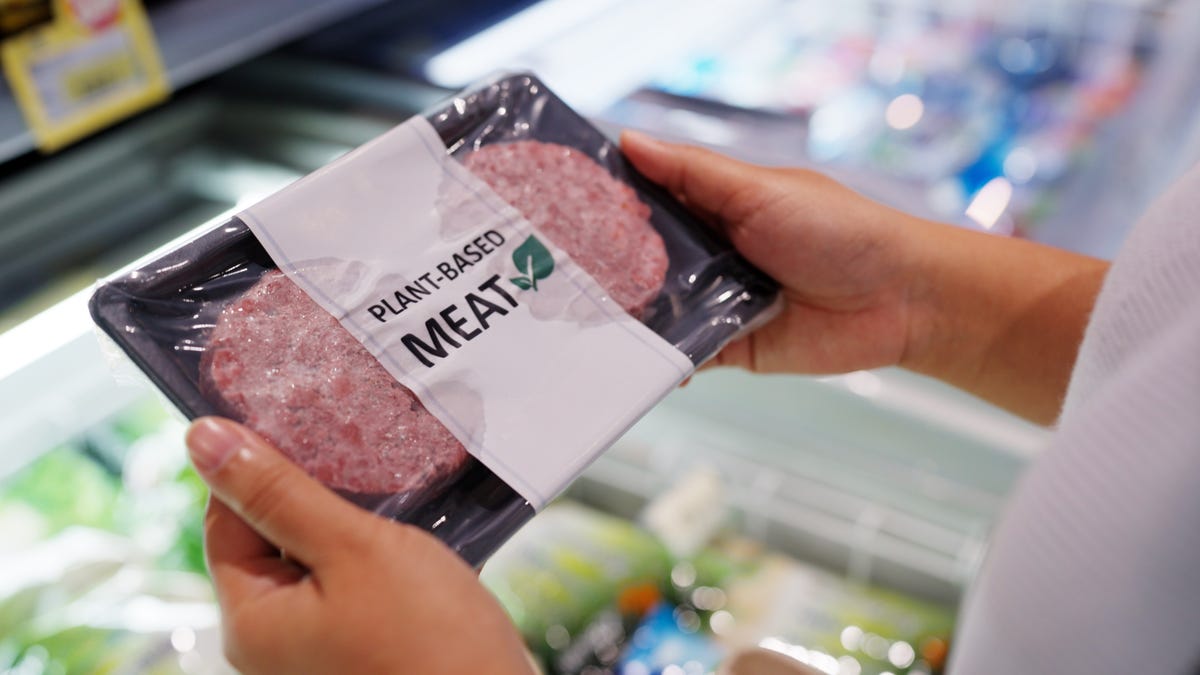[ad_1]
Veganuary is far behind us, but it’s never too late to explore a vegan diet. It’s easier than ever before, in fact, thanks to the numerous vegan meat alternatives available today. From Impossible and Beyond Meat burgers to Gardein Chick’n and Tofurky, plant-based meat is just about everywhere.
It’s not just in the grocery store, either. With more and more plant-based meal delivery services and vegan options at dine-in and fast food restaurants, going vegan is getting less difficult by the day.
All of this said, there’s one big question about vegan meat that a lot of people are just starting to ask: Is it healthy?
What are plant-based meats made of?
That, of course, depends on the meat alternative. Some plant-based meat options are nutrient-dense and primarily consist of minimally processed whole foods. But a lot of the most popular options on the market — and especially the ones that look and taste like real meat — aren’t so great for you.
Generally, vegan meat consists primarily of ingredients including:
- Soy
- Legumes
- Vegetables like peas or broccoli
- Fruits like jackfruit
That all sounds good, right? So why are we having a conversation about unhealthy plant-based meat? It’s all about what happens to those base ingredients.
To make things look and taste like meat, food manufacturers add filler ingredients such as wheat gluten, plenty of salt and artificial colors. In other words, when you choose a meat alternative that seems pretty darn similar to actual meat, it’s probably because that “meat” has been heavily processed.
This isn’t to say that all vegan meat options are just as bad for your health as processed meat. But yes, that vegan hot dog is probably just as unhealthy as a regular hot dog.
Plant-based meat can certainly go a long way toward mitigating the burden on the environment, supporting animal welfare and saving you money. But if you’re making the swap for health reasons, be conscientious about which meat alternative you choose.
Vegan meat health concerns

Chaay_Tee/iStock/Getty Images Plus
Let’s run down some of the biggest risks associated with unhealthy plant-based meat.
Highly processed
As we’ve mentioned before, to take something that isn’t meat and make it taste and look like real meat requires quite a bit of processing. Foods are more processed if they contain artificial ingredients or “natural flavors.” In meat substitutes specifically, ingredients such as soy protein isolate, soy protein concentrate and textured vegetable protein are processed ingredients.
That’s bad news because ultraprocessed foods increase your risk of:
- Obesity
- Dementia
- High blood pressure
- Type 2 diabetes
- Decreased life expectancy
Missing key nutrients
Beef, pork and poultry all give your body a complete protein, which means they contain all nine amino acids you need but can’t make on your own.
A lot of plant-based meat comes from ingredients that aren’t complete proteins on their own, like legumes and vegetables. If you’re opting for vegan meat, figure out which nutrients it doesn’t contain so you can supplement them. You should also know about plant-based complete protein options, like quinoa, tofu and tempeh.
Less protein
Most adults should be getting 0.8 grams of protein for every kilogram you weigh, plus more if you’re active. The US Department of Agriculture has a handy calculator to figure out how much you should be getting.
Some vegan meat contains less protein than real meat, although this has gotten better in recent years. Ultimately, to maintain a whole, healthy diet, you’ll probably want to supplement with vegan high-protein food such as legumes and nuts.
High in sodium and saturated fats
One of the biggest problems with plant-based meat comes from its sodium content. Just like processed animal meat, most vegan meat contains a fair measure of salt. Most of the sodium in our diets comes from processed foods. Read the label and specifically check the sodium level before you assume a meat alternative is a healthy swap.
This is particularly true if you have high blood pressure or other heart health problems.
Meat alternatives also commonly contain saturated fats due to the type of oils used, specifically coconut oil. Saturated fats are unhealthy fats that can increase the risk of heart disease and high cholesterol.
Bottom line
A lot of vegan meat alternatives that are highly processed are not great for you. However, not all meat substitutes are unhealthy. If you know how to read labels and choose healthier plant-based meat options, you will be able to find vegan meat made with organic ingredients sourced from whole foods that are lower in sodium and higher in both fiber and iron.
A plant-based diet can be incredibly healthy — plus cheaper and more environmentally and animal-friendly — as long as you stick with whole foods. Stocking your kitchen with the right tools to prep nourishing meals with minimally processed ingredients can help you feel your best. Homemade vegan meat made from veggies and legumes is ideal, but tofu, tempeh, and seitan are less-processed, high-protein meat alternatives.
The information contained in this article is for educational and informational purposes only and is not intended as health or medical advice. Always consult a physician or other qualified health provider regarding any questions you may have about a medical condition or health objectives.
[ad_2]
